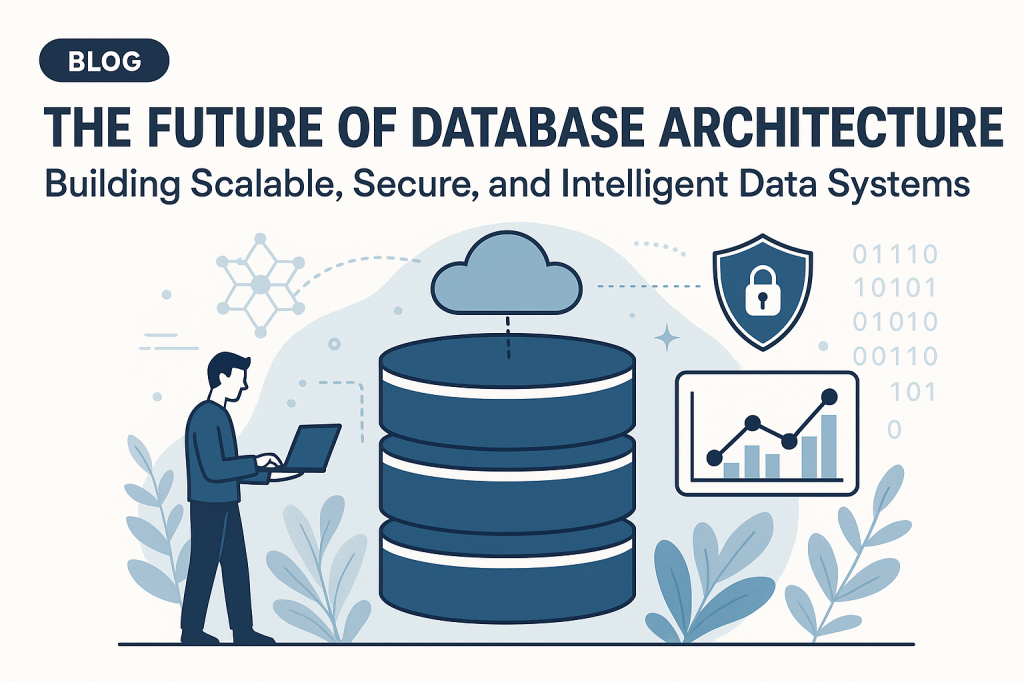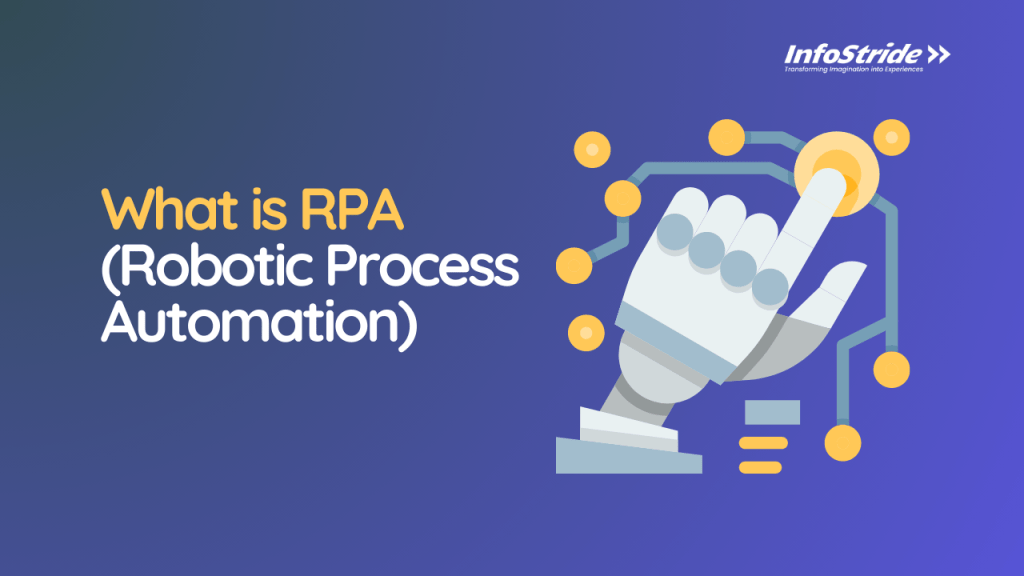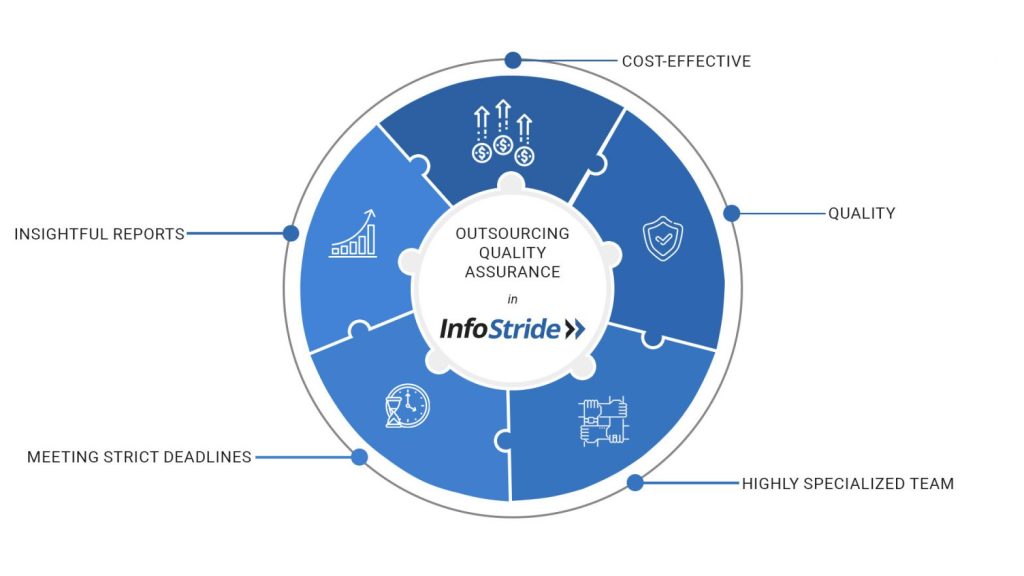Table of Content
Key Features of Hospital Management Software
Benefits of Using Hospital Management Software
Choosing the Right Hospital Management Software
How to Create Hospital Management Software
Average Cost to Build Hospital Management Software
The Future of Hospital Management Software
Partnering with InfoStride for Your Healthcare Management Software
In today’s fast-paced healthcare environment, efficiency is paramount. Hospitals globally are turning to technology to meet this demand, with Hospital Management Software (HMS) playing a critical role in transforming operations. Studies by the American Medical Association have shown that hospitals implementing HMS have seen a 20% reduction in operational costs and a 15% increase in patient satisfaction scores. These statistics underscore the profound impact that streamlined, digital solutions can have on the day-to-day functioning of healthcare facilities.
Managing a hospital is an inherently complex task. From handling patient data and scheduling appointments to processing billing and ensuring regulatory compliance, the administrative burden is immense. Many healthcare providers struggle with outdated systems that lead to inefficiencies, such as double-booked appointments, delayed billing, and lost patient records. These challenges not only disrupt hospital operations but also negatively affect the quality of patient care and the satisfaction of both patients and staff.
Hospital Management Software emerges as a comprehensive solution to these issues. By integrating various administrative and clinical functions into a single platform, HMS simplifies and automates routine tasks, allowing healthcare professionals to focus more on patient care rather than paperwork. From maintaining electronic health records to managing financial operations, HMS offers a suite of tools designed to enhance efficiency and improve patient outcomes. As we delve deeper into the components and benefits of HMS, it becomes clear how indispensable this technology has become in modern healthcare.
Key Features of Hospital Management Software
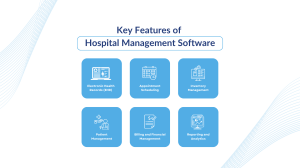
Hospital Management Software (HMS) is a multifaceted tool designed to address the various administrative and clinical challenges faced by healthcare providers. Its comprehensive suite of features ensures that hospitals can operate efficiently and provide high-quality care. Below, we explore some of the key functionalities that make HMS an indispensable asset for modern healthcare facilities.
Electronic Health Records (EHR)
At the heart of Hospital Management Software is the Electronic Health Records (EHR) system. EHRs are digital versions of patients’ paper charts and include a wide range of data such as medical history, diagnoses, medications, treatment plans, immunization dates, and test results. HMS centralizes these records, making them easily accessible to authorized healthcare providers. This not only enhances the accuracy and security of patient data but also facilitates coordinated care across different departments. By digitizing health records, HMS reduces paperwork, minimizes errors, and improves the overall efficiency of patient management.
Appointment Scheduling
Managing appointments effectively is crucial to maintaining smooth hospital operations and ensuring patient satisfaction. HMS simplifies appointment scheduling by providing a user-friendly interface for both patients and staff. Patients can book, reschedule, or cancel appointments online at their convenience, while hospital staff can easily track and manage schedules. The system also reduces the chances of double-booking and ensures that resources like examination rooms and medical staff are optimally allocated. Automated reminders and notifications help decrease no-show rates, further enhancing the efficiency of hospital services.
Billing and Financial Management
Handling billing and financial transactions is a complex task for any healthcare provider. Hospital Management Software streamlines these processes by automating billing, managing insurance claims, and handling financial reporting. It integrates various financial operations into a single system, reducing the likelihood of errors and ensuring timely payments. HMS can process claims, track payments, and generate invoices with ease. Moreover, detailed financial reports and analytics help hospital administrators monitor revenue, control costs, and make informed financial decisions.
Inventory Management
Hospitals must keep a close watch on their inventory to avoid shortages or overstocking of medical supplies, medications, and equipment. HMS includes robust inventory management features that track and manage the stock levels of various items. It alerts staff when supplies are running low and can even automate reordering processes. This ensures that hospitals maintain optimal inventory levels, reducing waste and minimizing the risk of supply shortages that could disrupt patient care.
Patient Management
From the moment a patient registers until they are discharged, Hospital Management Software plays a crucial role in managing their journey. HMS streamlines the patient registration process by collecting and storing personal and medical information efficiently. It also handles patient admissions, transfers between departments, and discharge processes. This cohesive management of patient data helps improve the overall patient experience, reducing wait times and ensuring that each step of their care is well-coordinated.
Reporting and Analytics
One of the standout features of Hospital Management Software is its ability to generate detailed reports and provide actionable insights through analytics. HMS can compile data from various sources and create comprehensive reports on patient demographics, treatment outcomes, financial performance, and operational efficiency. These reports are invaluable for hospital administrators and healthcare providers, helping them to identify trends, optimize resource allocation, and make evidence-based decisions to improve patient care and hospital operations.
Also Read: How to Develop a Healthcare App
Benefits of Using Hospital Management Software
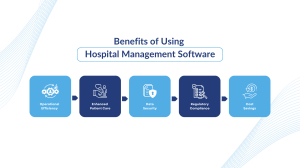
Adopting Hospital Management Software (HMS) offers numerous advantages that go beyond basic operational improvements. By transforming how hospitals manage their daily activities and patient care, HMS plays a pivotal role in enhancing overall efficiency, security, compliance, and financial health. Here’s a closer look at some of the key benefits of integrating HMS into healthcare operations.
Operational Efficiency
One of the most significant benefits of Hospital Management Software is its ability to streamline workflows and reduce administrative burdens. HMS automates routine tasks such as scheduling, billing, and inventory management, freeing up staff to focus on more critical aspects of patient care. By centralizing information and providing real-time access to data, HMS minimizes the need for manual paperwork and reduces the chances of errors. This leads to faster processing times and more efficient hospital operations. Furthermore, integrated communication tools within HMS facilitate better coordination among different departments, ensuring that patient care is delivered promptly and effectively.
Enhanced Patient Care
At its core, Hospital Management Software is designed to improve the quality of patient care. By providing healthcare professionals with quick and easy access to comprehensive patient information, HMS enables more accurate diagnoses and more personalized treatment plans. Streamlined processes for admissions, scheduling, and discharge ensure that patients receive timely and well-coordinated care. Additionally, automated reminders and follow-up notifications help maintain patient engagement and adherence to treatment plans. Overall, better data management and efficient workflows translate to shorter wait times, fewer errors, and a more positive patient experience.
Data Security
In an era where data breaches are a growing concern, HMS offers robust security measures to protect patient information. Hospital Management Software is equipped with advanced security features such as encryption, user authentication, and access controls to safeguard sensitive data. These systems ensure that only authorized personnel can access patient records and other confidential information. Regular software updates and compliance with industry standards further enhance the security of the system. By maintaining the integrity and confidentiality of patient data, HMS helps hospitals build trust with their patients and avoid potential legal liabilities associated with data breaches.
Regulatory Compliance
Compliance with healthcare regulations is crucial for any medical institution. HMS simplifies the process of adhering to various regulatory standards and reporting requirements. It helps hospitals maintain accurate records and generate required reports in formats that meet regulatory guidelines. Features like audit trails and automated documentation ensure that all activities within the hospital are recorded and can be reviewed for compliance. Whether it’s complying with data protection laws like HIPAA or meeting standards set by healthcare accrediting bodies, HMS provides the tools and documentation necessary to ensure that hospitals remain compliant and avoid penalties.
Cost Savings
Implementing Hospital Management Software can lead to substantial cost savings for healthcare facilities. By automating administrative tasks and improving operational efficiency, HMS reduces the need for extensive clerical work and manual data entry, which lowers labor costs. Efficient inventory management prevents overstocking and wastage, while streamlined billing processes reduce errors and delays in payment collections. Additionally, the analytical capabilities of HMS enable hospitals to identify cost-saving opportunities and optimize resource allocation. These savings can be reinvested into patient care and other critical areas, contributing to the overall financial health of the institution.
Choosing the Right Hospital Management Software
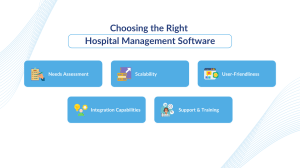
Selecting the right Hospital Management Software (HMS) is a critical decision that can profoundly impact a hospital’s operations and patient care. Given the variety of HMS solutions available in the market, it’s essential to approach this choice with careful consideration of the specific needs and long-term goals of your healthcare facility. Here’s a guide to help you navigate the process and choose the best HMS for your hospital.
Needs Assessment
The first step in selecting the right Hospital Management Software is conducting a thorough needs assessment. This involves evaluating the unique requirements of your hospital and identifying the key functionalities that the software must provide. Start by engaging with various stakeholders — including doctors, nurses, administrative staff, and IT professionals — to gather their input on current pain points and desired features. Consider aspects such as patient volume, types of services offered, existing technological infrastructure, and any specific regulatory or reporting requirements. This holistic approach ensures that the chosen HMS will address the specific challenges faced by your hospital and support its operational and clinical goals effectively.
Scalability
Healthcare facilities are dynamic environments, and their needs can change over time. Therefore, it’s crucial to choose a Hospital Management Software that can scale with your hospital’s growth. Scalability in HMS means the software can handle an increasing number of users, patients, and transactions without compromising performance. It also implies the ability to add new functionalities or modules as needed. For instance, if your hospital plans to expand its services or open new locations, the HMS should be able to accommodate these changes seamlessly. Opting for a scalable HMS ensures that your investment remains valuable and functional as your hospital evolves.
User-Friendliness
A critical factor in the success of any software implementation is user adoption. For Hospital Management Software, this means the interface must be intuitive and easy to navigate for all users, regardless of their technical expertise. A user-friendly HMS should provide clear, simple menus and workflows that align with the daily tasks of healthcare professionals. It should minimize the learning curve and enable staff to perform their duties efficiently without extensive training. Conducting usability testing with potential users during the selection process can help ensure that the HMS will be embraced by your team, leading to smoother operations and higher productivity.
Integration Capabilities
Hospitals typically rely on a variety of systems and applications for different functions such as laboratory management, radiology, pharmacy, and financial systems. It’s essential that the chosen Hospital Management Software can integrate seamlessly with these existing systems to ensure smooth data flow and operational continuity. Look for HMS solutions that support standard interoperability protocols (like HL7 or FHIR) and offer robust APIs for custom integrations. This will enable your hospital to maintain a unified ecosystem where data is consistently updated and accessible across all platforms, reducing the risk of errors and improving overall efficiency.
Support and Training
Robust customer support and comprehensive training are vital components of a successful HMS implementation. The software provider should offer extensive training programs to help your staff understand and utilize the system’s full capabilities. This includes initial onboarding as well as ongoing training to accommodate updates or new features. Additionally, reliable customer support is crucial for addressing any technical issues or queries that arise during daily operations. Evaluate the support options provided by the vendor, such as 24/7 availability, response times, and the availability of resources like user manuals or online help centers. Strong support and training ensure that your hospital can fully leverage the HMS and maintain operational excellence.
Also Read: Healthcare Business Ideas
How to Create Hospital Management Software
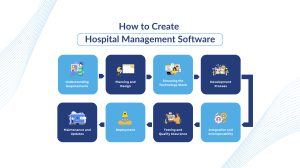
Creating Hospital Management Software (HMS) is a complex, multi-faceted endeavor that requires meticulous planning, a clear understanding of user needs, and a strategic approach to design and development. This section outlines the essential steps involved in developing an effective and robust HMS.
Understanding Requirements
The foundation of successful Hospital Management System Development lies in comprehensively understanding the needs of its users. This involves identifying and engaging with key stakeholders, including doctors, nurses, administrative staff, and patients.
- Identify Stakeholders: Begin by mapping out all potential users and stakeholders of the software. Each group will have distinct needs and requirements. For example, doctors may prioritize quick access to patient records, while administrative staff might focus on efficient billing and scheduling systems.
- Gather Requirements: Conduct interviews, surveys, and workshops with stakeholders to gather detailed insights into their daily workflows and pain points. This information will help identify the functionalities that the software must include to address these challenges effectively.
- Prioritize Functionalities: Once requirements are gathered, prioritize them based on factors such as urgency, frequency of use, and overall impact on hospital operations. This will guide the development process and ensure that the most critical features are implemented first.
Planning and Design
After understanding the requirements, the next step is to plan and design the software architecture and user interface, ensuring it meets the needs identified in the previous step.
- System Architecture: Choose an architecture that aligns with your hospital’s infrastructure and future goals. Common architectures include client-server, where the software runs on a server accessed by client devices, or cloud-based, which offers flexibility and scalability by hosting the software on the cloud.
- User Interface (UI) Design: Design an intuitive and accessible UI tailored to the different user roles. For instance, doctors need quick access to patient data, while admin staff require tools for scheduling and billing. Use user-centric design principles to create interfaces that are easy to navigate and reduce the learning curve.
- Database Design: Develop a robust and scalable database structure to manage various types of data such as patient records, billing information, and inventory. Consider using relational databases (e.g., SQL) for structured data and NoSQL databases for flexible, scalable data storage options.
Choosing the Technology Stack
Selecting the right technology stack is crucial for building a functional and maintainable HMS. The choice of programming languages, frameworks, and databases will depend on the project’s specific requirements and constraints.
- Programming Languages and Frameworks: Popular choices for HMS development include Python (with frameworks like Django or Flask), Java (with Spring or Hibernate), and .NET (with ASP.NET). For front-end development, consider frameworks like React or Angular to build dynamic, responsive user interfaces.
- Database Technologies: Depending on the data requirements, you might choose SQL databases (like MySQL or PostgreSQL) for structured data and transactional consistency, or NoSQL databases (like MongoDB) for flexible schema design and scalability.
- Cloud Services: If opting for a cloud-based architecture, consider cloud service providers like AWS, Azure, or Google Cloud. These platforms offer services for hosting, database management, and scalability, which can simplify the deployment and maintenance of HMS.
Development Process
Adopting an efficient development process is key to building and delivering high-quality software. Agile methodology is particularly effective for complex projects like HMS.
- Agile Methodology: Embrace an iterative development approach, which allows for continuous feedback and refinement. Agile practices such as sprints and daily stand-ups help keep the project on track and ensure that stakeholder feedback is incorporated throughout the development cycle.
- Module Development: Break down the HMS into key modules, such as Electronic Health Records (EHR), billing, and appointment scheduling. Develop these modules incrementally, starting with the most critical ones. This modular approach allows for easier testing and integration.
Integration and Interoperability
Ensuring that the HMS can seamlessly integrate with existing systems and third-party applications is essential for creating a cohesive healthcare ecosystem.
- System Integration: Design the HMS to integrate smoothly with other systems used in the hospital, such as laboratory information systems, pharmacy management systems, and radiology systems. This integration is crucial for maintaining consistent data flow and operational efficiency.
- Standardized Protocols: Use industry-standard protocols like HL7 or FHIR for data exchange to facilitate interoperability with other healthcare applications and systems. This ensures that the HMS can communicate effectively with external systems and share data securely and accurately.
Testing and Quality Assurance
Thorough testing and quality assurance are vital to ensure that the HMS is reliable, secure, and performs well under various conditions.
- Unit Testing: Conduct unit testing to validate the functionality of individual components and modules. This helps identify and fix issues early in the development process.
- Integration Testing: Test how different modules of the HMS work together as a whole. This ensures that the integrated system performs as expected and that data flows correctly between modules.
- User Acceptance Testing (UAT): Involve end-users in testing the system under real-world conditions. UAT helps verify that the HMS meets the needs of its users and provides a final check before deployment.
Deployment
Deploying the HMS effectively is crucial to minimize disruptions and ensure a smooth transition to the new system.
- Deployment Options: Decide between on-premises deployment, where the software is installed on local servers, or cloud-based deployment, which offers scalability and remote access. Each option has its own advantages depending on the hospital’s infrastructure and needs.
- Smooth Deployment Process: Plan the deployment to include user training and support. Ensure that staff are familiar with the new system and have access to help resources to ease the transition. Phased deployment can also be effective, starting with a pilot phase before a full-scale rollout.
Maintenance and Updates
Post-deployment, regular maintenance and updates are essential to keep the HMS running smoothly and efficiently.
- Regular Updates: Schedule regular updates to fix bugs, enhance performance, and add new features. Staying up-to-date with software improvements ensures that the HMS continues to meet evolving user needs and technological advancements.
- Ongoing Technical Support: Provide ongoing technical support to address any issues that arise and assist users with troubleshooting. Effective support is crucial for maintaining user confidence and ensuring that the HMS remains a reliable tool in daily hospital operations.
When considering the average cost to build Hospital Management Software (HMS), it’s essential to understand that the expenses can vary widely based on the scope and specific requirements of the project. Here’s a general breakdown of the average costs involved in developing HMS:
Average Cost to Build Hospital Management Software
- Basic HMS System: A basic HMS with essential features like patient management, appointment scheduling, and billing functionalities can cost anywhere from $50,000 to $100,000. This estimate typically includes development, basic UI/UX design, and initial testing.
- Mid-range HMS System: A more comprehensive HMS that includes additional modules such as electronic health records (EHR), advanced reporting and analytics, and integration with external systems might range from $100,000 to $300,000. This cost reflects more extensive development, UI/UX design, testing phases, and possibly initial deployment.
- Enterprise-level HMS System: Large-scale HMS solutions tailored for multi-location hospitals or healthcare networks, with advanced features, custom integrations, high scalability, and robust security measures, can exceed $300,000. Costs for enterprise-level HMS can range widely depending on the complexity and customization required.
Additional Cost Considerations
- Maintenance and Updates: Ongoing costs for maintaining and updating the HMS post-deployment can range from $10,000 to $50,000+ annually. This includes regular updates, bug fixes, security patches, and technical support.
- Infrastructure and Hosting: Costs for hosting the HMS on-premises servers or cloud-based platforms like AWS or Azure can vary significantly based on usage and scalability needs.
- Integration and Customization: Additional expenses may arise from integrating the HMS with existing systems, customizing features to meet specific hospital workflows, and ensuring regulatory compliance.
Factors Influencing Cost
- Geographical Location: Developer rates vary globally, with higher costs in regions like North America and Western Europe compared to Eastern Europe, Asia, or South America.
- Scope and Complexity: The more extensive and complex the HMS features and functionalities, the higher the development costs.
- Regulatory Compliance: Ensuring compliance with healthcare regulations (e.g., HIPAA, GDPR) may require additional development efforts and legal consultations, impacting costs.
While these are average estimates, the actual cost to build Hospital Management Software can vary widely based on project specifics and regional factors. It’s crucial for healthcare providers and stakeholders to conduct a thorough needs assessment, define clear requirements, and collaborate closely with an experienced custom software development services provider to ensure a successful HMS implementation within budgetary constraints.
Also Read: Healthcare App Development Cost
The Future of Hospital Management Software
As Hospital Management Software (HMS) continues to evolve, it is poised to revolutionize healthcare administration by leveraging cutting-edge technologies and addressing emerging challenges. This section explores the future trends and advancements in HMS, as well as potential challenges and solutions on the horizon.
Technological Advancements
- Artificial Intelligence (AI): AI is set to transform HMS by enhancing decision-making processes, automating repetitive tasks, and improving patient outcomes through predictive analytics. AI-powered algorithms can analyze vast amounts of patient data to offer personalized treatment recommendations and optimize hospital workflows.
- Telemedicine Integration: The integration of telemedicine into HMS enables remote patient consultations, virtual diagnoses, and remote monitoring. This trend is especially significant in enhancing access to healthcare services, reducing wait times, and increasing patient convenience.
- Mobile Health (mHealth): Mobile apps integrated with HMS allow patients to manage appointments, access medical records, and communicate with healthcare providers conveniently from their smartphones or tablets. This trend promotes patient engagement and empowers individuals to take an active role in their healthcare management.
- Blockchain Technology: Blockchain offers secure and transparent management of electronic health records (EHRs) by providing immutable records and enhancing data privacy. It ensures data integrity, reduces fraud, and facilitates interoperability among healthcare providers.
Future Challenges and Solutions
- Data Security and Privacy: With the increasing digitization of healthcare data, ensuring robust cybersecurity measures and compliance with data privacy regulations (e.g., GDPR, HIPAA) will remain critical. Advanced encryption methods and blockchain technology can strengthen data security within HMS.
- Interoperability: Integrating diverse healthcare systems and ensuring seamless data exchange across platforms remain challenges. Standardized protocols like HL7 and FHIR will play a crucial role in achieving interoperability, enabling healthcare providers to access comprehensive patient information efficiently.
- Scalability and Integration with Emerging Technologies: As healthcare systems expand and adopt new technologies, HMS must be scalable to accommodate growing patient volumes and evolving healthcare needs. Flexibility in architecture and the ability to integrate with emerging technologies will be essential for future-proofing HMS.
- User Adoption and Training: Effectively onboarding healthcare professionals to new HMS features and functionalities will be crucial. User-friendly interfaces, ongoing training programs, and support from IT departments will facilitate smooth adoption and maximize the benefits of HMS.
Partnering with InfoStride for Your Healthcare Management Software
If you’re considering building a healthcare management software solution, InfoStride is your trusted partner. With extensive experience and expertise in custom healthcare software development, we are committed to delivering cutting-edge HMS systems that align with your unique requirements and industry standards.
- Tailored Solutions: We specialize in creating customized healthcare management software that meets the specific needs of hospitals and healthcare providers, ensuring seamless integration with existing systems and workflows.
- Advanced Technology: Leveraging the latest technologies such as AI, telemedicine integration, and mobile health, we empower healthcare facilities to optimize operations, improve patient outcomes, and stay ahead in a rapidly evolving industry.
- Comprehensive Support: From initial consultation to deployment and beyond, InfoStride provides comprehensive support, including MVP development services, ongoing maintenance, and updates, to ensure your HMS remains secure, efficient, and compliant.
Partner with InfoStride to transform your healthcare management strategy. Contact us today to discuss how we can collaborate on building a robust HMS solution tailored to your organization’s needs.
Frequently Asked Questions
1. What is Hospital Management Software (HMS)?
Hospital Management Software (HMS) is a comprehensive system designed to streamline and automate hospital operations, including patient management, appointment scheduling, billing, and administrative tasks.
2. How can Hospital Management Software benefit healthcare facilities?
HMS improves operational efficiency by centralizing patient records, automating processes like billing and appointment scheduling, and enhancing overall patient care through better data management.
3- What features should I look for in Hospital Management Software?
Key features to consider include Electronic Health Records (EHR) management, appointment scheduling, billing and invoicing, inventory management, and robust reporting capabilities.
4- How does InfoStride approach Hospital Management Software development?
InfoStride specializes in custom hospital management software development, leveraging advanced technologies and providing comprehensive support from initial consultation to MVP development and ongoing maintenance.
5- How secure is patient data in Hospital Management Software?
InfoStride prioritizes data security in HMS development, implementing robust encryption methods and adhering to healthcare regulations like HIPAA to ensure patient data confidentiality and integrity.
6- Why choose InfoStride as your hospital management software development company?
InfoStride stands out as a hospital management software development company due to our expertise in creating tailored solutions that address the unique needs of healthcare providers. We combine cutting-edge technology with in-depth industry knowledge to deliver efficient, secure, and scalable HMS solutions.
7- What is involved in Hospital Management System Development?
Hospital Management System development encompasses the design and creation of software that automates and streamlines various hospital operations. This includes developing modules for patient management, billing, scheduling, inventory, and reporting. A robust hospital management system is tailored to meet the specific needs of a healthcare facility, ensuring integration with existing systems and compliance with healthcare regulations.
8- How does a Patient Management System enhance healthcare delivery?
A Patient Management System (PMS) is a critical component of Hospital Management Software that focuses on managing patient information and interactions efficiently. It streamlines patient registration, appointment scheduling, medical record management, and communication between healthcare providers and patients. This enhances the overall patient experience by reducing wait times, minimizing errors, and ensuring timely access to patient data for informed decision-making.
9- What are the benefits of using an Online Hospital Management System?
An Online Hospital Management System offers the flexibility of accessing hospital management functionalities through web-based applications. This means that healthcare providers can manage patient data, schedule appointments, handle billing, and oversee other administrative tasks remotely. The benefits include real-time access to data, improved collaboration among staff, and the ability to provide continuous patient care, even outside traditional office hours.
10- What is a SaaS Hospital Management System, and how does it differ from traditional systems?
A SaaS (Software as a Service) Hospital Management System is a cloud-based solution that is hosted and maintained by a service provider. Unlike traditional on-premises systems, SaaS HMS offers several advantages: lower upfront costs, scalability, automatic updates, and the ability to access the system from anywhere with an internet connection. This model reduces the need for extensive IT infrastructure and support within the hospital, allowing for easier implementation and maintenance.
11- How can Case Management Software improve healthcare operations?
Case Management Software in healthcare focuses on the coordination and management of patient care activities, particularly for complex cases requiring multidisciplinary approaches. It helps healthcare providers track patient progress, manage treatment plans, and ensure continuity of care across various services. This software enhances the ability to deliver personalized care, reduces duplication of services, and improves patient outcomes by facilitating efficient communication and resource management.
12- What are the key considerations for Hospital Management System Development?
When developing a Hospital Management System, key considerations include understanding the specific needs of the hospital, choosing the right technology stack, ensuring data security and compliance, integrating with existing systems, and providing user-friendly interfaces. It’s also crucial to plan for scalability and future updates to accommodate growth and technological advancements.
13- How secure is an Online Hospital Management System compared to traditional systems?
Online Hospital Management Systems are designed with robust security measures, including data encryption, user authentication, and regular security audits to protect patient information. While they offer the advantage of remote access and scalability, it’s essential to ensure that the service provider complies with industry standards such as HIPAA or GDPR and maintains rigorous security protocols to safeguard sensitive healthcare data.
14- Why should healthcare providers consider a SaaS Hospital Management System?
Healthcare providers should consider a SaaS Hospital Management System for its cost-effectiveness, ease of deployment, and flexibility. SaaS solutions eliminate the need for significant upfront investment in IT infrastructure and provide automatic updates, ensuring that the software remains current with the latest features and security patches. Additionally, the ability to access the system from any location facilitates improved collaboration and continuous patient care.


